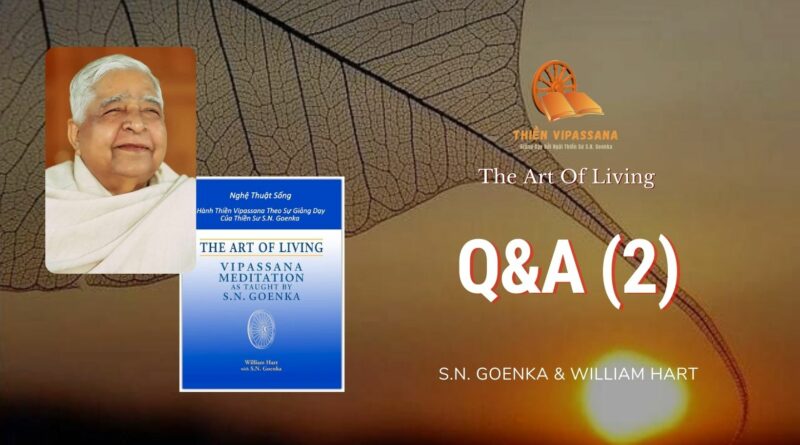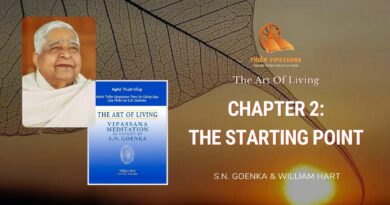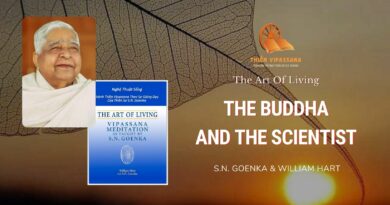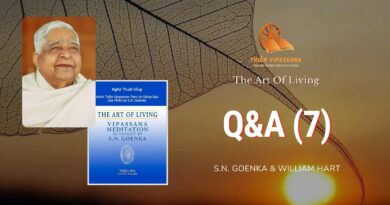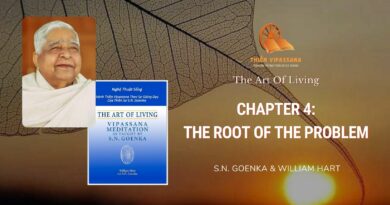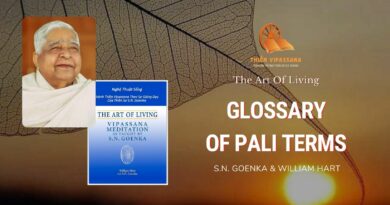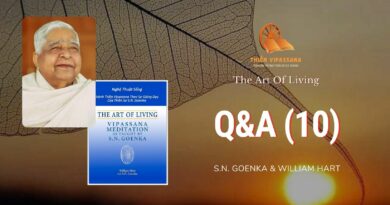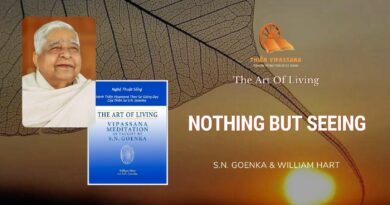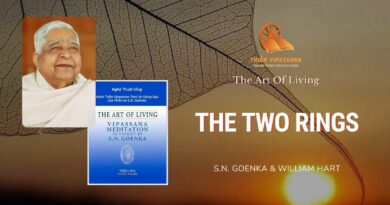Questions and Answers
QUESTION: When you say “mind,” I’m not sure what you mean. I can’t find the mind.
N. GOENKA: It is everywhere, with every atom. Wherever you feel anything, the mind is there. The mind feels.
Then by the mind you don’t mean the brain?
Oh no, no, no. Here in the West you think that the mind is only in the head. It is a wrong notion.
Mind is the whole body?
Yes, the whole body contains the mind, the whole body!
You speak of the experience of “I” only in negative terms. Hasn’t it a positive side? Isn’t there an experience of “I” which fills a person with joy, peace, and rapture?
By meditation you will find that all such sensual pleasures are im-permanent; they come and pass away. If this “I” really enjoys them, if they are “my” pleasures, then “I” must have some mastery over them. But they just arise and pass away without my control. What “I” is there?
I’m speaking not of sensual pleasures but of a very deep level.
At that level, “I” is of no importance at all. When you reach that level, the ego is dissolved. There is only joy. The question of “I” does not arise then.
Well, instead of “I,” let us say the experience of a person.
Feeling feels; there is no one to feel it. Things are just happening, that’s all. Now it seems to you that there must be an “I” who feels, but if you practice, you will reach the stage where ego dissolves. Then your question will disappear!
I came here because I felt “I” needed to come here.
Yes! Quite true. For conventional purposes, we cannot run away from “I” or “mine.” But clinging to them, taking them as real in an ultimate sense will bring only suffering.
I was wondering whether there are people who cause suffering for us?
Nobody causes suffering for you. You cause the suffering for your-self by generating tensions in the mind. If you know how not to do that, it becomes easy to remain peaceful and happy in every situ-ation.
What about when someone else is doing wrong to us?
You must not allow people to do wrong to you. Whenever someone does something wrong, he harms others and at the same time he harms himself. If you allow him to do wrong, you are encouraging him to do wrong. You must use all your strength to stop him, but with only good will, compassion, and sympathy for that person. If you act with hatred or anger, then you aggravate the situation. But you cannot have good will for such a person unless your mind is calm and peaceful. So practice to develop peace within yourself, and then you can solve the problem.
What is the point of seeking peace within when there is no peace in the world?
The world will be peaceful only when the people of the world are peaceful and happy. The change has to begin with each individual. If the jungle is withered and you want to restore it to life, you must water each tree of that jungle. If you want world peace, you ought to learn how to be peaceful yourself. Only then can you bring peace to the world.
I can understand how meditation will help maladjusted, unhappy people, but how about someone who feels satisfied with his life, who is already happy?
Someone who remains satisfied with the superficial pleasures of life is ignorant of the agitation deep within the mind. He is under the illusion that he is a happy person, but his pleasures are not lasting, and the tensions generated in the unconscious keep increasing, to appear sooner or later at the conscious level of the mind. When they do, this so-called happy person becomes miserable. So why not start working here and now to avert that situation?
Is your teaching Mahāyāna or Hīnayāna?
Neither. The word yāna actually means a vehicle that will carry you to the final goal, but today it is mistakenly given a sectarian connotation. The Buddha never taught anything sectarian. He taught Dhamma, which is universal. This universality is what attracted me to the teachings of the Buddha, which gave me benefit, and therefore this universal Dhamma is what I offer to one and all, with all my love and compassion. For me, Dhamma is neither Mahāyāna, nor Hīnayāna, nor any sect.
Bài viết này được trích từ cuốn sách The Art Of Living – Thiền Sư S.N.Goenka và William Hart.

